Meet the Mini Goldendoodle, a charming hybrid that captures hearts with its teddy bear-like appearance and friendly demeanor. This delightful breed results from crossing a Golden Retriever with a Miniature or Toy Poodle, combining the intelligence and elegance of a Poodle with the affectionate nature of a Golden Retriever. Emerging in the mid-1990s, the Miniature Goldendoodle has quickly become a favorite among dog lovers seeking a friendly, intelligent, and hypoallergenic companion. Their compact size and adorable features appeal to families, first-time pet owners, and those living in smaller spaces. If you’re looking for a canine companion that is as loving as it is cute, the Mini Goldendoodle might just be the perfect match for you.
History of the Mini Goldendoodle
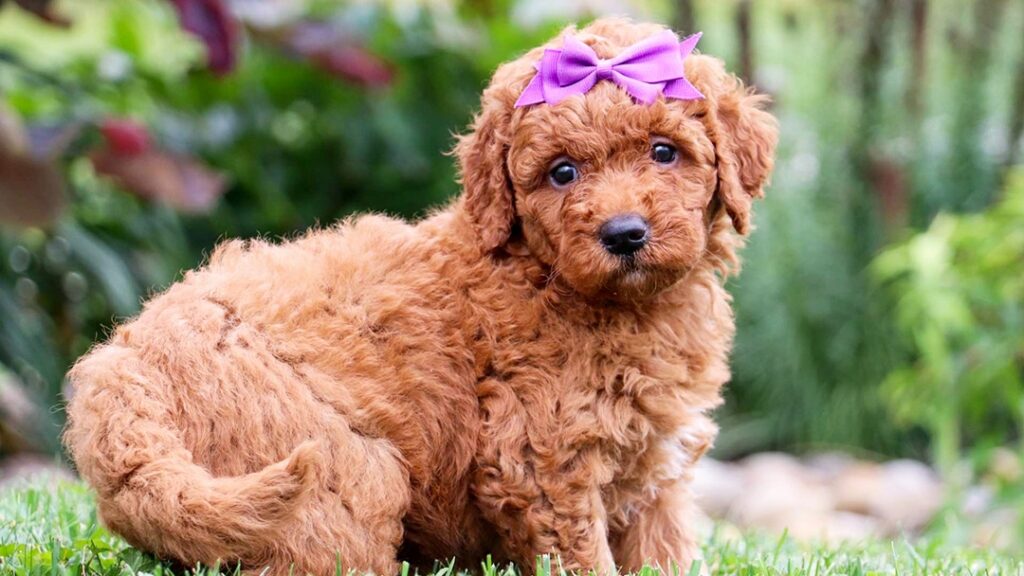
Miniature Goldendoodle debuted in the mid-1990s as part of a growing trend towards Poodle hybrids known for their intelligence, reduced shedding, and hypoallergenic coats. This crossbreed blends the Golden Retriever’s best traits and the Miniature Poodle. Golden Retrievers are celebrated for their friendly, easy-going nature. They were initially bred in Scotland in the 19th century to retrieve game for hunting. Miniature Poodles, known for their sharp intelligence and agility, originated in Germany but gained popularity in France, where they were bred into various sizes, including standard, miniature, and toy.
The Mini Goldendoodle was created to produce a dog with the Poodle’s smarts, hypoallergenic coat, and the Golden Retriever’s amiable disposition. As a result, the Mini Goldendoodle is an excellent companion and an intelligent and gentle pet that adapts well to various living situations and owner experiences. Today, they are celebrated for their affectionate nature and versatile capabilities, from serving as therapy dogs to joyful family pets.
Mini Goldendoodle Breed: Overview

The mini goldendoodle combines the endearing qualities of its parent breeds into a small, manageable package. Typically standing between 13 to 20 inches in height and weighing 15 to 35 pounds, they are ideal for both apartments and houses with yards. Mini Goldendoodle lifespan ranges from 10 to 15 years, providing constant companionship and joy to their families.
These dogs come in various colors: brown, white, silver, black, cream, red, blue, parti, sable, tan, apricot, and merle. Such diversity makes each Mini Goldendoodle somewhat unique in appearance.
Ideal for first-time pet owners and families with children, Miniature Goldendoodles are known for their loving and loyal nature. They are hypoallergenic, which makes them suitable for households with mild to moderate allergies. Additionally, their intelligence and gentle temperament make them easy to train and great for active owners who enjoy a playful, outgoing pet.
Miniature Goldendoodle Temperament and Social Traits
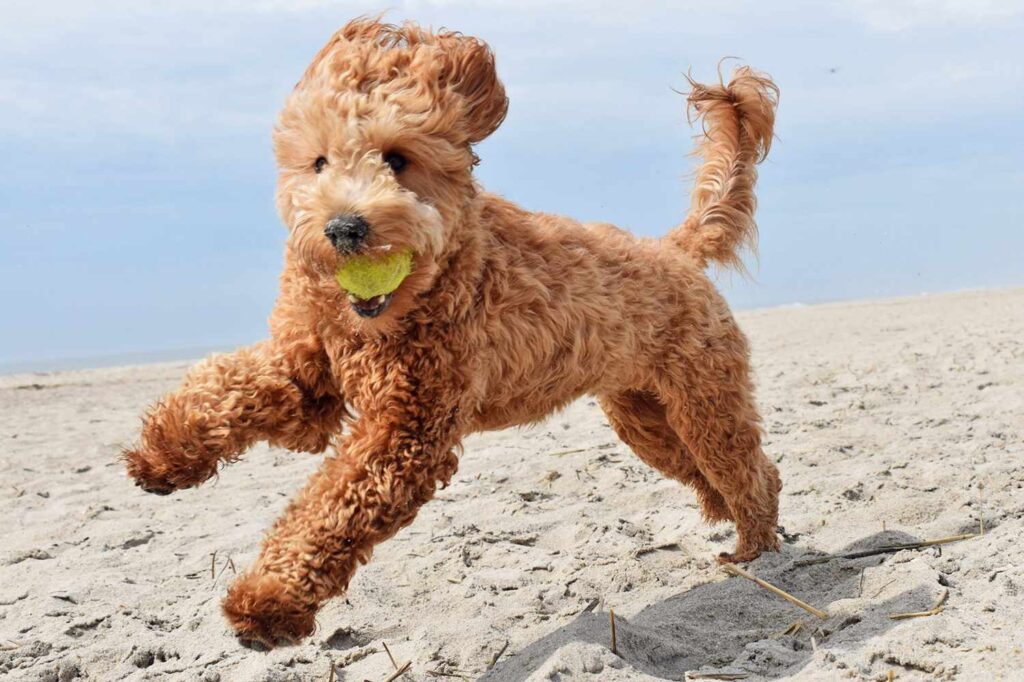
Miniature Goldendoodles are celebrated for their affectionate, friendly nature, which makes them excellent companions for all types of families. Inheriting the Golden Retriever’s loving and loyal disposition and the Poodle’s intelligence and playfulness, these dogs are eager to please and easy to train. They thrive on social interaction and form strong bonds with their human families.
Known for their gentle temperament, Mini Goldendoodles are particularly good with children and other pets. They are playful and patient, making them a fantastic playmate for kids. Their sociability also extends to other dogs, and they generally do well in homes with multiple pets, provided they have been adequately socialized from a young age.
These dogs also exhibit a high level of social intelligence, often sensing the emotional needs of their owners and acting accordingly. Whether it’s a comforting nuzzle when you’re down or playful antics to make you laugh, a Mini Goldendoodle knows how to brighten your day. Their outgoing nature also means they love meeting new people, often turning a simple walk into a friendly meet-and-greet session.
However, their sociability means they do not like being left alone for long periods, as isolation can lead to anxiety and mischief. Active social lives and mental stimulation are crucial to keeping a Mini Goldendoodle happy and well-behaved.
Also Read: Goldendoodle Puppies: Everything You Need To Know
Mini Goldendoodle Puppies
Miniature Goldendoodle puppies are irresistibly cute and full of life, making them a popular choice for many families. From the moment they arrive, these puppies demonstrate a keen intelligence and an eagerness to interact with people and other pets. Potential owners should consider several important aspects before bringing one of these adorable puppies home.
Firstly, the health and longevity of Mini Goldendoodles are notable, with a lifespan typically ranging from 10 to 15 years. They inherit the hybrid vigor from their mixed breed lineage, often resulting in fewer health issues than purebreds. Early veterinary care, including vaccinations and check-ups, is essential to set them on a path to a healthy life.
Training and socialization should start early for Mini Goldendoodle puppies. Their sharp intellect and desire to please make them highly responsive to training from a young age. House training, basic commands, and social behavior can be taught effectively, setting the foundation for a well-mannered adult dog.
Mini Goldendoodles are naturally active and require regular exercise to manage their energy levels. Even as puppies, they should be engaged in daily play and activities to stimulate their minds and bodies. This not only helps in their physical development but also in curbing any potential behavioral issues due to pent-up energy.
Lastly, socializing them early is crucial. Introducing your Mini Goldendoodle puppy to various people, places, and situations helps them develop into confident, well-adjusted dogs. This early exposure ensures they become sociable and adaptable, ready to enthusiastically embrace family life and adventures.
Mini Goldendoodle Health and Wellness
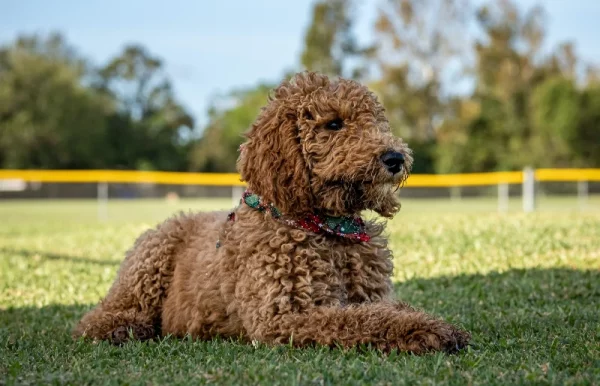
Mini Goldendoodles generally enjoy good health, benefiting from the hybrid vigor associated with crossbred animals. This vigor often leads to reduced hereditary health problems, yet potential owners should be aware of some specific health concerns inherited from the parent breeds.
Dietary Needs: Mini Goldendoodles require a balanced diet to maintain their health and energy. They do well on high-quality dog food with a mix of protein, fats, and carbohydrates. Since they can be prone to weight gain, especially if they inherit the Golden Retriever’s love for food, monitoring their diet and ensuring regular exercise is essential.
Exercise Requirements: Despite their smaller size, Mini Goldendoodles possess a significant amount of energy that needs to be expended through daily physical activities. Regular walks, play sessions, and, if possible, swimming can help maintain their physical health and manage their energy levels. A lack of sufficient exercise can lead to behavioral issues such as excessive barking or destructiveness.
Common Health Issues: Like all breeds, mini goldendoodles are susceptible to certain health conditions. These may include hip dysplasia, a common problem in Golden Retrievers, and various eye disorders, such as progressive retinal atrophy, which is common in Poodles.
Grooming Needs: Their coat, which varies from straight to curly depending on the traits inherited from their Poodle ancestry, requires regular grooming to prevent matting and reduce allergens. Brushing several times a week and professional grooming every few months can keep their coat in good condition and minimize shedding.
Preventative Health Care: Regular veterinary visits for vaccinations, parasite control, and health screenings are important. As Mini Goldendoodles can inherit the Golden Retriever’s propensity for heart issues and the Poodle’s dental sensitivities, preventive care like dental cleanings and heart checks should be part of their routine health management.
Also Read: Goldendoodle Vs Labradoodle: Which Breed Is Better?
Miniature Goldendoodle Training and Behavior
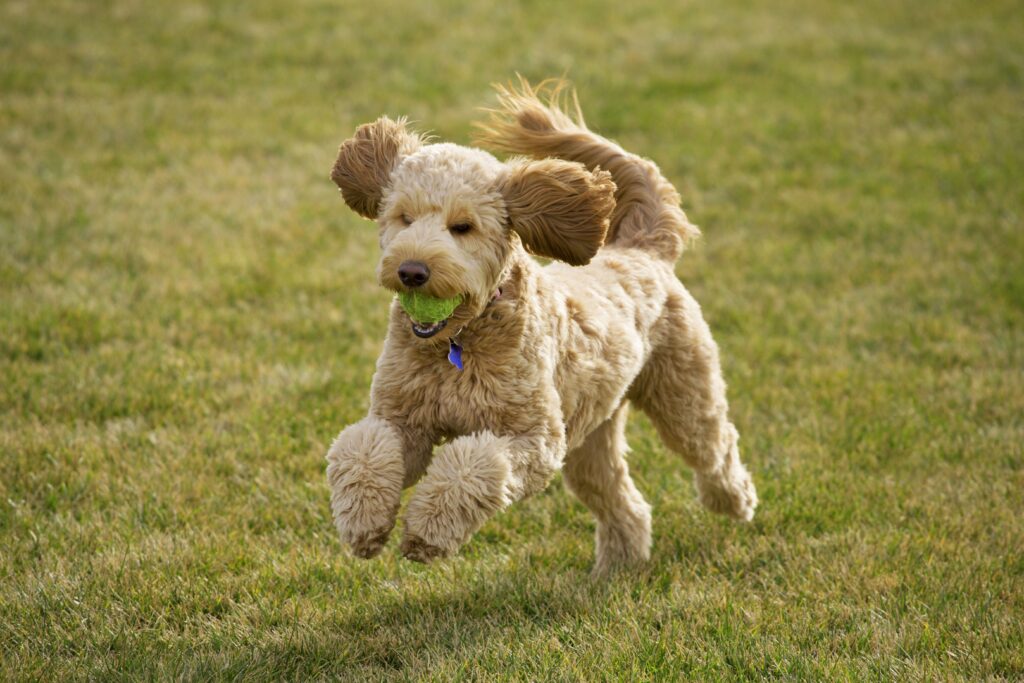
Training a mini goldendoodle can be a rewarding experience thanks to its intelligent and eager-to-please nature. These dogs inherit their sharp minds from the golden retriever and the Poodle, making them quick learners and highly responsive to positive reinforcement techniques.
Training Tips:
- Start Early: When your mini Goldendoodle puppy comes home, begin training it. Early training and socialization help prevent undesirable behaviors and encourage good habits.
- Use Positive Reinforcement: Mini Goldendoodles respond well to rewards such as treats, praise, and play. Positive reinforcement encourages them to repeat good behavior and strengthens your bond.
- Keep Sessions Short and Fun: Mini Goldendoodles might have shorter attention spans due to their playful nature. To maintain their interest, keep training sessions brief and engaging.
- Consistency is Key: Consistent commands, rewards, and consequences are crucial for practical training. Ensure all family members use the same rules and commands to avoid confusing your dog.
Behavioral Traits:
- Social Needs: Mini Goldendoodles are very friendly and thrive on interaction with humans and other dogs. Without adequate socialization, they may develop anxiety or shyness.
- Adaptability: They adapt well to various living situations if they have enough space to play and explore. Their flexibility makes them ideal for both houses with yards and larger apartments.
- Vocalization: While generally not known for excessive barking, Mini Goldendoodles will alert their owners to strangers or unusual noises. Training can help manage any unnecessary barking.
Common Challenges:
- Separation Anxiety: Mini Goldendoodles are prone to separation anxiety and do best when they have company. Strategies such as crate training, leaving engaging toys, and gradually increasing alone time can help manage this issue.
- Chewing: Puppies may chew on furniture and belongings. Providing appropriate chew toys and teaching them what is not for chewing can curb this behavior.
Living with a Mini Goldendoodle
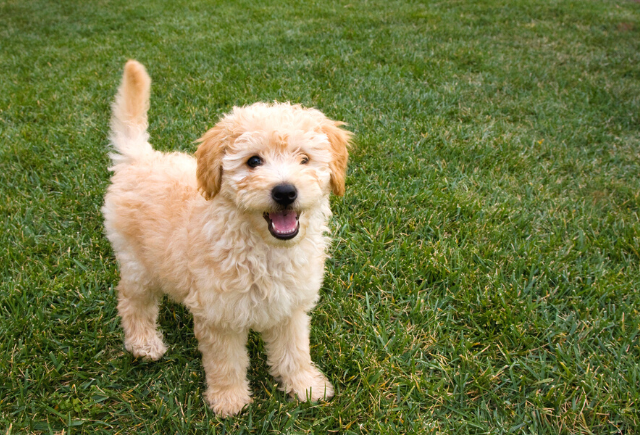
Adopting a mini goldendoodle brings joy and energy into your home. These dogs are well-suited for various living situations, from spacious houses with backyards to cozy apartments, as long as their physical and emotional needs are met.
- Daily Routine: Mini Goldendoodles thrive on structure. A consistent daily routine, including set times for meals, walks, play, and rest, helps them feel secure and well-adjusted. They particularly enjoy interactive toys and games that challenge their intellect and satisfy their retriever instincts.
- Social Interaction: These dogs are inherently social and crave companionship, making them excellent family pets. They enjoy being involved in family activities and can become sad and lonely if left alone for extended periods. Including your Mini Goldendoodle in outings and social events can keep them happy and engaged.
- Exercise Needs: Despite their smaller size, Mini Goldendoodles possess plenty of energy that needs to be expended through regular exercise. Daily walks, fetch games, and, if possible, swimming are great ways to keep them physically fit and mentally stimulated.
- Training Continuity: Training shouldn’t stop after puppyhood. Continuing training throughout their life helps maintain good behavior and strengthens their bond. Regular training sessions also provide mental stimulation, which is crucial for this intelligent breed.
- Health Care: Routine veterinary check-ups are essential to monitor their health, as Mini Goldendoodles can inherit some health issues from their parent breeds. Attention to grooming, including regular brushing and ear cleaning, is also important, especially since their floppy ears can make them prone to ear infections.
Living with a Mini Goldendoodle is a commitment to active engagement and regular care, but the rewards of their companionship are immense. They bring much love and laughter into any home, making every day a little brighter with their cheerful disposition.
Also Read: Top 7 Most Popular Dog Breeds 2024
Health Concerns and Preventative Care
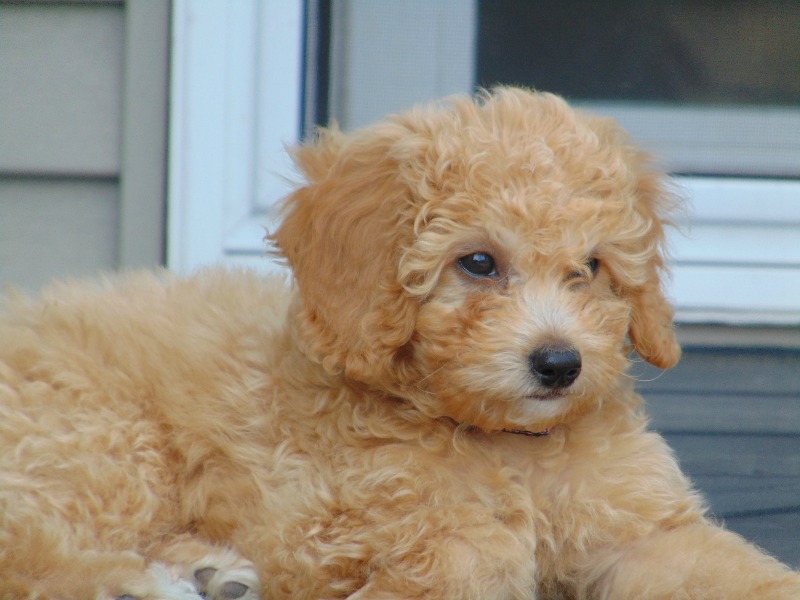
While mini Goldendoodles generally benefit from the robust health associated with hybrid breeds, they can inherit some specific health concerns from their parent breeds, the golden retriever and the Miniature Poodle. Being proactive about their health can help ensure your pet’s long, happy life.
Common Health Issues:
- Hip Dysplasia: This genetic condition, more common in larger breeds, can also affect Mini Goldendoodles due to their Golden Retriever lineage. It involves the malformation of the hip joint, which can lead to arthritis or pain.
- Von Willebrand’s Disease is a blood clotting disorder that can be passed down from the Poodle side. It affects the dog’s ability to clot blood, leading to excessive bleeding from minor injuries.
- Eye Disorders: Both parent breeds are susceptible to eye conditions like progressive retinal atrophy and cataracts. Regular eye exams can help catch these issues early.
- Allergies and Skin Conditions: Like many breeds, Mini Goldendoodles can develop allergies, which may manifest as itchy skin or other dermatological issues. Allergy testing and dietary management can help alleviate symptoms.
Preventative Care:
- Regular Vet Visits: Routine check-ups can detect health issues before they become severe. It’s also an excellent time to discuss weight management and nutrition, which are crucial for preventing obesity-related health problems.
- Dental Care: Good oral hygiene is vital, as dental disease can lead to more significant health issues. Regular brushing and professional cleanings can help maintain healthy teeth and gums.
- Proper Nutrition: Feeding your mini Goldendoodle a balanced diet suitable for its age, size, and activity level helps maintain its overall health and supports a robust immune system.
- Exercise: Regular physical activity supports joint health and helps prevent conditions like hip dysplasia from worsening. It also keeps your dog mentally stimulated and physically fit.
Screening Tests: Genetic testing for diseases common in Poodles and Golden Retrievers can provide valuable insights into your pet’s health risks and guide breeding decisions.
FAQs
1. What are the different types of Mini Goldendoodles?
Mini Goldendoodles come in several varieties, depending on the mix and generation. The most common types include:
- F1 Mini Goldendoodle: This first-generation cross involves a purebred Golden Retriever and a purebred Miniature Poodle.
- F1B Mini Goldendoodle: Involves crossing an F1 Mini Goldendoodle back with a Miniature Poodle, enhancing the breed’s hypoallergenic properties.
- F2 Mini Goldendoodle: This second-generation cross involves two F1 Mini Goldendoodles.
2. How easy is it to train a Mini Goldendoodle?
Mini Goldendoodles are known for their intelligence and eagerness to please, which makes them relatively easy to train. They respond well to positive reinforcement techniques such as treats and praise. Consistency and patience are key during training sessions.
3. Are Mini Goldendoodles good apartment dogs?
Yes, Mini Goldendoodles can adapt well to apartment living due to their size and generally calm demeanor. However, they require regular exercise and mental stimulation to stay healthy and happy.
4. Do Mini Goldendoodles bark a lot?
Mini Goldendoodles are not typically known for excessive barking. They may bark to notify you of strangers or unusual situations, but they are generally not noisy dogs.
5. What should I feed my Mini Goldendoodle?
A balanced diet rich in high-quality proteins, fats, and carbohydrates is ideal for Mini Goldendoodles. To prevent obesity, adjust their food intake based on their age, weight, and activity level. Always consult your vet to tailor a diet that fits their health needs.
6. Are Mini Goldendoodles good with kids and other pets?
Yes, Mini Goldendoodles are excellent family pets. They are known for their gentle nature and playfulness, making them great companions for children. They also generally get along with other pets, primarily when raised together or adequately socialized.
7. Can Mini Goldendoodles be left alone?
Mini Goldendoodles can experience separation anxiety if left alone for long periods. It’s crucial to gradually accustom them to being alone and provide plenty of toys and activities to keep them entertained.
8. How much grooming do Mini Goldendoodles need?
Even though they are considered low-shedders, they require regular grooming to maintain their coat’s health and manage shedding. Regular brushing, occasional baths, and professional grooming sessions can keep their fur in good condition.
9. Are Mini Goldendoodles hypoallergenic?
While no dog is entirely hypoallergenic, Mini Goldendoodles are often suitable for individuals with mild allergies due to their Poodle heritage, which is known for minimal shedding.
10. How long do Mini Goldendoodles live?
Mini Goldendoodles typically live 10 to 15 years. Proper care, a healthy diet, regular exercise, and regular veterinary check-ups can help ensure they live full, healthy lives.


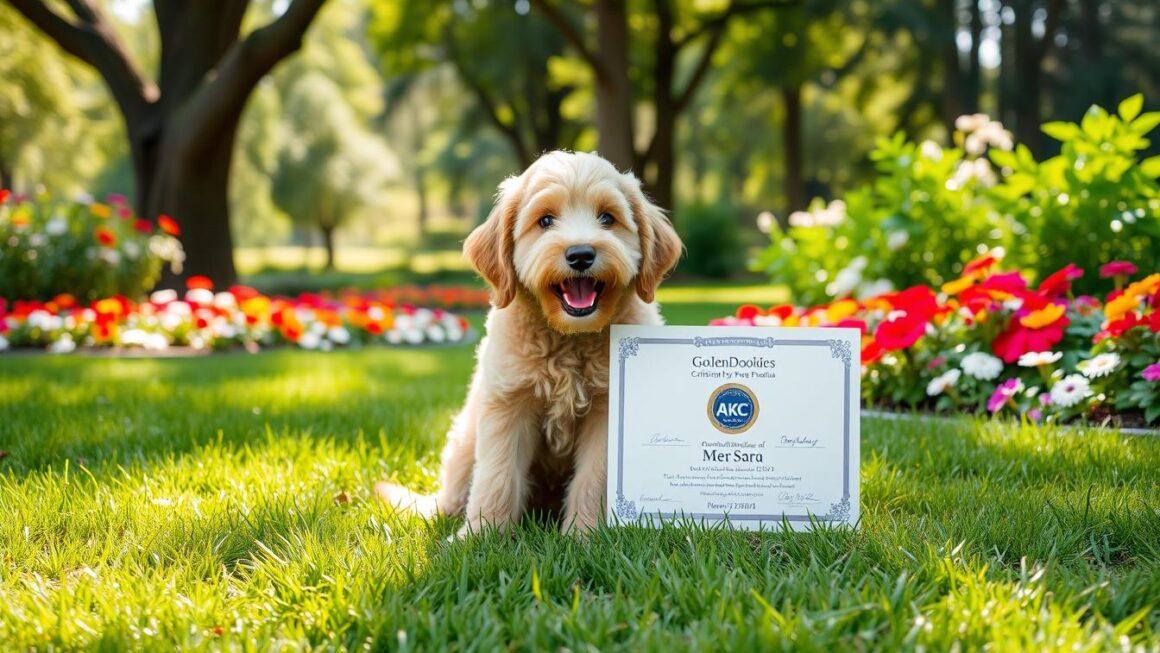


One thought on “Mini Goldendoodle Dog Breed Guide”